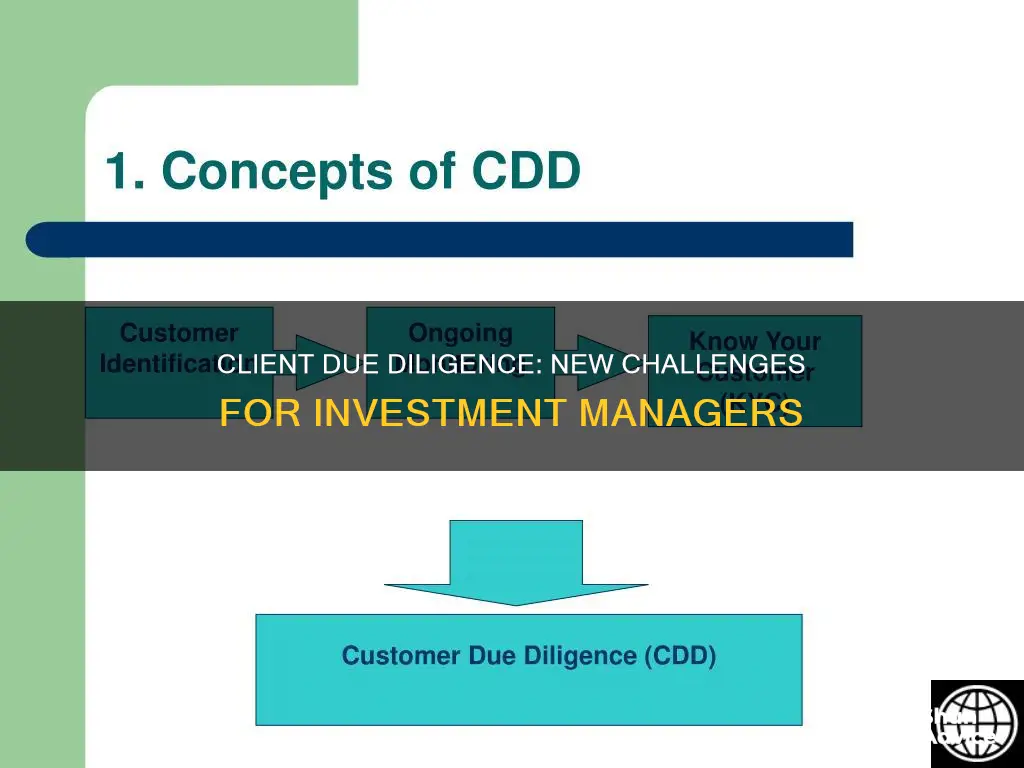
Performing client due diligence has changed for investment managers in several ways. Firstly, the traditional methods of conducting due diligence are now considered outdated, and there is a growing trend towards digitizing the process to improve efficiency and reduce the risk of errors. Investment managers are increasingly leveraging technology and data to streamline their operations and make more informed decisions. This includes using software and advanced security measures to protect sensitive data and facilitate secure communication and data transfer.
Secondly, investment managers are facing evolving client demands, market conditions, and investment trends. To adapt to these changes, investment managers are outsourcing investment management functions, such as due diligence, to third-party providers. This allows them to access specialized expertise, expand their range of investment options, and create more personalized experiences for their clients.
Additionally, due diligence processes have become more comprehensive and rigorous over time. Investment managers need to evaluate a fund's investment process, risk management, operational environment, and business model. They must also consider a fund's past failures and successes, scrutinize the manager's background and qualifications, and analyze financial statements and balance sheets.
Overall, performing client due diligence for investment managers has evolved to become more digitized, specialized, and rigorous, with a focus on adapting to changing market conditions and delivering superior client experiences.
What You'll Learn

The benefits of digitisation
Digitising the client due diligence process brings a range of benefits for investment managers. Firstly, it reduces the time frame for due diligence, allowing investors to select managers more quickly and for asset managers to respond promptly. This enables investors to assess more opportunities and expand their buy list. Secondly, digitisation enables the automatic assessment of information, facilitating the detection of changes, scoring and final decision-making. It also helps to avoid mistakes that can be costly in terms of time and energy.
Another significant advantage of digitised due diligence is the ability to track information and communication flow in real time, which is vital for spotting crucial issues as they arise. Digitisation also saves costs as the process is faster, more accurate, and requires less workforce, providing long-term monetary benefits. Furthermore, digitisation enhances data security, consistency, and retrieval, addressing concerns about data breaches and theft.
Digitising the due diligence process also enables ongoing manager monitoring, providing investors with relevant and timely results on manager performance, operational risk data, and ESG considerations. This allows investors to spot deviations and potential risks in real time. Ultimately, digitisation of the client due diligence process enables investment managers to make more efficient and informed decisions, reducing risks and improving outcomes.
Building a Diverse Investment Portfolio: Wages and Strategies
You may want to see also

Outsourcing due diligence
Additionally, outsourcing due diligence to experienced third-party specialists gives advisors access to their knowledge and expertise in evaluating managers. These specialists often have deep insights into the complexities of the investment landscape, enabling them to identify potential risks and opportunities that an advisor might otherwise miss.
From a cost perspective, outsourcing due diligence can be more cost-effective than hiring additional in-house experts. It allows advisors to avoid the costs associated with finding, hiring, training, and managing new employees.
Furthermore, digitizing the due diligence process can bring additional benefits, such as reducing the time frame for assessments, enabling automatic assessment of information, and facilitating the detection of changes and final decision-making.
Overall, outsourcing due diligence provides financial advisors with specialised expertise, expanded investment options, improved data analysis capabilities, and cost savings, ultimately enabling them to deliver better client experiences.
The Perfect Investment Portfolio: Strategies for Success
You may want to see also

Evaluating the investment process and risk control
Investment managers need to adapt to the changing landscape of wealth management. Investor demand for personalized experiences continues to grow, and technology has made it possible to access more data and information than ever. To better serve clients, investment managers must find ways to evolve their businesses to maximize ideas and deliver superior experiences to clients.
One way to achieve this is by outsourcing investment management functions, such as due diligence, to third-party providers. This gives advisors access to a wider range of investment options for client portfolios, including specialized strategies, institutional investments, or access to niche markets. It also enables them to benefit from the specialized knowledge and experience of third-party providers when evaluating managers and identifying potential risks and opportunities.
Advisors should also consider digitizing their due diligence processes. Traditional methods for performing external investment manager due diligence are outdated and inefficient, with a high risk of mistakes and inconsistent information tracking. By digitizing, advisors can reduce the time frame for due diligence, enabling faster selection of appropriate managers and prompt responses from asset managers. Digitization also enables automatic assessment of information, facilitates the detection of changes, and improves decision-making.
When evaluating investment managers, it is important to focus on the defining characteristics of the investment management organizations, such as organizational structure, manager diversity, self-awareness, and the active vs. passive debate. Due diligence should be an investigative discovery process rather than a standardized documentation process.
Monitoring Your Investment Portfolio: How Frequently Should You Check?
You may want to see also

Assessing the fund's operations and business model
Evaluation of the Fund's Operations
- Controls and Policies: Investment managers should assess the existence and effectiveness of controls and policies established to protect investor's money, such as controls for detecting and preventing fraudulent activities.
- Operating Procedures: It is important to review the fund's internal procedures and assess any potential risks arising from these procedures.
- Compliance: Compliance practices, such as restrictions related to employees and the code of ethics, should be examined as part of operational due diligence.
- Documents and Disclosures: Investment managers should review fund documents for consistency and ensure that any changes are properly authorised and disclosed. This includes reviewing terms related to fees, liquidity, redemption periods, and the manager's authority.
- Financial Statements: Analysing the fund's financial statements, including income statements and balance sheets, is crucial to understanding the fund's financial health and performance.
- Service Providers: Investment managers should also evaluate the fund's service providers and their roles to ensure they meet the required standards.
Evaluation of the Fund's Business Model
- Risk Assessment: Investment managers should identify and assess the fund's business model risk, including the potential for fraud and excessive leverage.
- Performance Evaluation: By reviewing historical performance, investment managers can identify if the fund consistently generates returns and how it performs compared to its competitors.
- Strategic Vision: Understanding the fund's strategic vision and investment philosophy is essential. Investment managers should assess if the fund has a clear, identifiable competitive edge and a well-defined investment process.
- Team Competency: The competency and experience of the fund's team, including the investment team and management, are vital factors in the evaluation process.
- Sustainability and ESG Factors: Considering the fund's approach to environmental, social, and governance (ESG) factors is increasingly important for investment managers.
- Diversity and Inclusion: Evaluating the fund's commitment to diversity, equity, and inclusion, as well as its ability to adapt to changing market conditions, is crucial.
By conducting a thorough assessment of the fund's operations and business model, investment managers can make informed decisions, mitigate risks, and identify funds that align with their investment strategies and values.
Why You Need an Investment Manager: Expert Guidance
You may want to see also

Manager evaluation
- Investment Philosophy and Process: A good investment manager should have a well-defined and consistent investment philosophy that guides their decision-making. Look for managers who take a long-term approach, focus on fundamental research, and have a disciplined process for sourcing, evaluating, and exiting investments.
- Performance and Track Record: While past performance does not guarantee future results, evaluating a manager's track record is crucial. Analyze their performance across different market cycles and compare it against relevant benchmarks and peers.
- Risk Management: Understanding how a manager manages risk is vital. Assess their risk management framework, including their approach to position sizing, portfolio diversification, and stress testing.
- Organizational Structure and Stability: Evaluate the stability and longevity of the investment firm. Look for a well-established firm with a strong and experienced team that has worked together through different market cycles.
- Manager Diversity and Cognitive Diversity: Cognitive diversity and a range of perspectives within the management team are essential. Seek out firms with diverse teams, including diverse social backgrounds, educational backgrounds, and investment experiences.
- Training and Development: Inquire about the investment firm's commitment to training and development. Ask about their processes for continuous improvement and knowledge enhancement among their investment professionals.
- Transparency and Communication: Transparency and open communication are critical. Select managers who are willing to share information, provide insights into their investment process, and maintain open lines of communication with investors.
- Fees and Costs: Understand the fee structure and costs associated with the investment manager. Evaluate whether the fees are aligned with the value provided and assess if they are competitive within the industry.
- Sustainability and ESG Integration: Increasingly, investors are considering sustainability and environmental, social, and governance (ESG) factors in their investment decisions. Evaluate the manager's approach to integrating ESG factors into their investment process and their commitment to sustainable investing.
- Client Service and Support: Assess the level of client service and support provided by the investment manager. Consider their responsiveness, accessibility, and ability to tailor their services to meet your specific needs.
- Regulatory Compliance: Ensure that the investment manager adheres to regulatory requirements and has a strong compliance framework in place. This includes evaluating their processes for client protection, data security, and risk management.
By conducting a comprehensive evaluation of investment managers, investors can make more informed decisions and establish partnerships that are aligned with their investment objectives and risk tolerance.
FDI vs Portfolio Investment: Understanding the Key Differences
You may want to see also
Frequently asked questions
Technology has allowed investment managers to digitize the due diligence process, making it more efficient and secure. With digitization, due diligence teams can focus on the discovery, verification, and analysis of managers, rather than spending time and resources on collecting and organizing information manually. Additionally, digital tools enable the automatic assessment of information, facilitate the detection of changes, and improve decision-making accuracy.
Due diligence for investment managers typically includes evaluating the investment process, risk management, operational environment, and business model assessment. Investment managers need to understand the investment strategy, assess risk exposures, and evaluate the fund's operations and business model. This involves reviewing the fund's prospectus, asset allocation decisions, portfolio strategy, and performance.
Outsourcing due diligence to third-party specialists can provide investment managers with access to expanded investment options and a diverse range of money managers. It also allows them to leverage specialized expertise and gain insights into potential risks and opportunities. Additionally, outsourcing can reduce costs, streamline operations, and enable investment managers to focus more on client relationships and business development activities.
When evaluating an investment manager's track record, it is essential to compare their past performance to that of their competitors using similar strategies. It is also important to determine if the track record has been audited and if it can be used for statistical decision-making. Assessing the reliability and trustworthiness of the manager's track record is crucial, especially when dealing with new managers with limited references.







